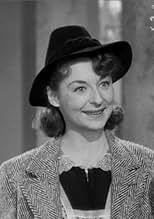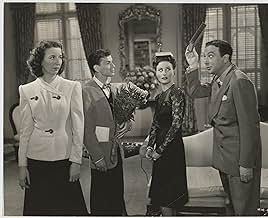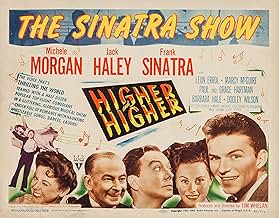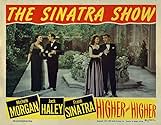AVALIAÇÃO DA IMDb
6,0/10
859
SUA AVALIAÇÃO
Adicionar um enredo no seu idiomaWith their employer bankrupt, servants scheme to marry maid Millie to a rich husband. But Frank Sinatra lives across the street...With their employer bankrupt, servants scheme to marry maid Millie to a rich husband. But Frank Sinatra lives across the street...With their employer bankrupt, servants scheme to marry maid Millie to a rich husband. But Frank Sinatra lives across the street...
- Direção
- Roteiristas
- Artistas
- Indicado a 2 Oscars
- 2 indicações no total
Michèle Morgan
- Millie Pico
- (as Michele Morgan)
Robert Andersen
- Announcer at Butler's Ball
- (não creditado)
Paul Bradley
- Wedding Guest
- (não creditado)
Ralph Brooks
- Restaurant Customer
- (não creditado)
Tanis Chandler
- Debutante
- (não creditado)
Avaliações em destaque
As a lover of all kinds of music spanning many era's, I can safely say that Frank Sinatra is far and away my personal favourite and arguably the best male vocalist of all time.
When Higher and Higher was made back in 1944, Sinatra was still working on his craft. He had a typical 1940's Big Band voice, no different really from the likes of Ray Ebberly, Johnny Desmond or Dick Haymes but he was better in many ways. He had yet to develop his own distinctive sound which would become instantly recognisable and would eventually make him the singing sensation of the 20th century.
Yet in this largely forgettable romantic comedy, the tools are there and you are starting to see the true craftsman at work.
Sinatra played himself, which I thought was a mistake as the love stories would have worked better if he was in character and completely detached from his true self. At the time Frank was happily married to his first wife and was already the father of two, yet the script announces his engagement to the lovely Barbara Hale (of Perry Mason fame.) Obviously RKO thought very little of unimportant crimes such as bigamy.
Despite these flagrant liberties taken with Frank's personal life, the film is redeemed as he is given perfect chance to prove to us just why he was the most popular singer of the war years with powerful ballads like, 'I Couldn't Sleep a Wink Last Night,' and, 'A Lovely Way to Spend an Evening.'
What was a double treat for me was that another one of my all time favourite singers also featured in the cast. Mel Torme was an excellent artist but, 'The Man with the Velvet Voice' was not really given much opportunity in this vehicle to show us what a great singer he really was.
However despite the great songs expertly executed by the man himself, and excellent performances by the entire cast, nothing seems to rescue this film from drab dullness.
I think it's main failing was a rather weak and transparent plot, but hell..... if it past a dreary hour or so and took your mind off the horrors and reality of the war, then it had done what it had set out to do.
When Higher and Higher was made back in 1944, Sinatra was still working on his craft. He had a typical 1940's Big Band voice, no different really from the likes of Ray Ebberly, Johnny Desmond or Dick Haymes but he was better in many ways. He had yet to develop his own distinctive sound which would become instantly recognisable and would eventually make him the singing sensation of the 20th century.
Yet in this largely forgettable romantic comedy, the tools are there and you are starting to see the true craftsman at work.
Sinatra played himself, which I thought was a mistake as the love stories would have worked better if he was in character and completely detached from his true self. At the time Frank was happily married to his first wife and was already the father of two, yet the script announces his engagement to the lovely Barbara Hale (of Perry Mason fame.) Obviously RKO thought very little of unimportant crimes such as bigamy.
Despite these flagrant liberties taken with Frank's personal life, the film is redeemed as he is given perfect chance to prove to us just why he was the most popular singer of the war years with powerful ballads like, 'I Couldn't Sleep a Wink Last Night,' and, 'A Lovely Way to Spend an Evening.'
What was a double treat for me was that another one of my all time favourite singers also featured in the cast. Mel Torme was an excellent artist but, 'The Man with the Velvet Voice' was not really given much opportunity in this vehicle to show us what a great singer he really was.
However despite the great songs expertly executed by the man himself, and excellent performances by the entire cast, nothing seems to rescue this film from drab dullness.
I think it's main failing was a rather weak and transparent plot, but hell..... if it past a dreary hour or so and took your mind off the horrors and reality of the war, then it had done what it had set out to do.
When the household staff of a wealthy family find out that their employers have gone broke, they concoct a dubious scheme: have new maid Millie (Michele Morgan) pretend to be the daughter of the rich family long enough to wed a wealthy suitor and get her hands on his money, after which she'll pay the other servants handsomely. Butler Michael (Jack Haley) manages the scheme despite having feelings for Millie himself, while next door neighbor Frank Sinatra (Frank Sinatra) keeps popping over to hit on Millie, as well as sing a few tunes.
The story is minor, and the humor thin, but it was fun seeing so many later major stars in early roles. Mel Torme looks like he's about 13 years old, Barbara Hale is youthful yet still mature, and Victor Borge is a long way from the goofball that I used to see on PBS so often in the 70's and 80's. The real draw is Sinatra, of course, playing a version of himself. He sings several songs, but doesn't have much acting to do. He's very thin and looks like he's wearing a suit 3 sizes too big. One of his songs earned an Oscar nomination for Best Song ("I Couldn't Sleep a Wink Last Night"), as did the film's score by C. Bakaleinikoff.
The story is minor, and the humor thin, but it was fun seeing so many later major stars in early roles. Mel Torme looks like he's about 13 years old, Barbara Hale is youthful yet still mature, and Victor Borge is a long way from the goofball that I used to see on PBS so often in the 70's and 80's. The real draw is Sinatra, of course, playing a version of himself. He sings several songs, but doesn't have much acting to do. He's very thin and looks like he's wearing a suit 3 sizes too big. One of his songs earned an Oscar nomination for Best Song ("I Couldn't Sleep a Wink Last Night"), as did the film's score by C. Bakaleinikoff.
This may not be one of the best movies ever made but overall it's a very enjoyable, light-hearted piece of froth in which everyone involved seems to be having a good time. Highly recommended for it's feel-good factor alone. OK, so Frank Sinatra's "acting" leaves a lot to be desired but his singing is a great redeeming feature and the songs fit in perfectly with the romantic atmosphere of the film. Sinatra went on to make many more films where his undoubted acting ability shone through but in this, his first venture into Hollywood, his voice, not his acting, is his main contribution to this movie. I've just watched it again on TV and it still lifts my mood as much as it did the first time I saw it many many years ago.
Higher and Higher was one of Rodgers&Hart's lesser Broadway musicals it only had a run of 84 performances on Broadway in 1940. Yet it yielded one of their bigger hits It Never Entered My Mind.
Nevertheless except for one minor song, So Disgustingly Rich, the entire Broadway score was scrapped when RKO bought the film rights. Instead a whole new score by Jimmy McHugh and Harold Adamson was written, mostly to accommodate one Francis Albert Sinatra who was making his feature film debut.
Sinatra who had done some vocal cameos in previous films, takes a leaf from the page of his singing rival Bing Crosby. When Bing did his feature film debut in The Big Broadcast, he played Bing Crosby. Frank Sinatra took on the role of Frank Sinatra and I can't think of anyone who could have done a better job.
The Chairman of the Board is billed third here behind stars Jack Haley and Michele Morgan. He's the butler and she's the scullery maid to Leon Errol. In fact Errol is a millionaire who hasn't paid his help for seven months. Mainly because he's about to go belly up into chapter 11 or so he informs the staff.
Errol's a delightful old soul to work for and none of the staff want to lose a good thing. They pool their resources and get Michele Morgan to impersonate Errol's daughter who's over in Switzerland with her mother. The idea being to snag a rich bankroll in the hopes rescuing the family fortune. Only Michele starts looking at another.
It's a slight plot and certainly no worse than a whole lot of musicals, but RKO invested this film with a good cast of players. Barbara Hale and Elizabeth Risdon play another débutante and her mother who suspect something's not right, Victor Borge is a fortune seeking no account, Dooley Wilson, Paul Hartman, Grace Hartman, Marcy McGuire, Mel Torme and Mary Wickes, play others of the Errol household staff. Not a bad bunch at all.
Sinatra sang three good ballads all of them had some kind of commercial success, The Music Stopped, A Lovely Way to Spend an Evening, and I Couldn't Sleep a Wink Last Night. The last one was nominated for an Oscar for Best Song, but lost to Alice Faye's You'll Never Know.
1943 was the year of the Musician's Union Strike against the recording industry. To get their material out, Frank Sinatra recorded the songs from Higher and Higher with an acapella chorus for Columbia. Bing Crosby recorded songs from his film Dixie in the same manner for Decca. Both of them were denounced by the president of the union, James C. Petrillo as strikebreakers and both did not cross the picket line again. The strike wasn't settle completely until 1944 although Decca broke ranks earlier from the other record companies and settled earlier than Columbia, RCA Victor and the others.
The strike provided some anxious moments for Sinatra. He had just left the Tommy Dorsey Orchestra when the strike was called. It closed off a needed venue for his artistry when he wasn't sure whether leaving Dorsey would prove to be a right career move.
Fortunately Higher and Higher was received well a legend was launched.
Nevertheless except for one minor song, So Disgustingly Rich, the entire Broadway score was scrapped when RKO bought the film rights. Instead a whole new score by Jimmy McHugh and Harold Adamson was written, mostly to accommodate one Francis Albert Sinatra who was making his feature film debut.
Sinatra who had done some vocal cameos in previous films, takes a leaf from the page of his singing rival Bing Crosby. When Bing did his feature film debut in The Big Broadcast, he played Bing Crosby. Frank Sinatra took on the role of Frank Sinatra and I can't think of anyone who could have done a better job.
The Chairman of the Board is billed third here behind stars Jack Haley and Michele Morgan. He's the butler and she's the scullery maid to Leon Errol. In fact Errol is a millionaire who hasn't paid his help for seven months. Mainly because he's about to go belly up into chapter 11 or so he informs the staff.
Errol's a delightful old soul to work for and none of the staff want to lose a good thing. They pool their resources and get Michele Morgan to impersonate Errol's daughter who's over in Switzerland with her mother. The idea being to snag a rich bankroll in the hopes rescuing the family fortune. Only Michele starts looking at another.
It's a slight plot and certainly no worse than a whole lot of musicals, but RKO invested this film with a good cast of players. Barbara Hale and Elizabeth Risdon play another débutante and her mother who suspect something's not right, Victor Borge is a fortune seeking no account, Dooley Wilson, Paul Hartman, Grace Hartman, Marcy McGuire, Mel Torme and Mary Wickes, play others of the Errol household staff. Not a bad bunch at all.
Sinatra sang three good ballads all of them had some kind of commercial success, The Music Stopped, A Lovely Way to Spend an Evening, and I Couldn't Sleep a Wink Last Night. The last one was nominated for an Oscar for Best Song, but lost to Alice Faye's You'll Never Know.
1943 was the year of the Musician's Union Strike against the recording industry. To get their material out, Frank Sinatra recorded the songs from Higher and Higher with an acapella chorus for Columbia. Bing Crosby recorded songs from his film Dixie in the same manner for Decca. Both of them were denounced by the president of the union, James C. Petrillo as strikebreakers and both did not cross the picket line again. The strike wasn't settle completely until 1944 although Decca broke ranks earlier from the other record companies and settled earlier than Columbia, RCA Victor and the others.
The strike provided some anxious moments for Sinatra. He had just left the Tommy Dorsey Orchestra when the strike was called. It closed off a needed venue for his artistry when he wasn't sure whether leaving Dorsey would prove to be a right career move.
Fortunately Higher and Higher was received well a legend was launched.
As a stage play it must have been a hilarious farce, as a film with a
truly great cast it is very funny indeed. To have all those appealing
character actors like Mary Wickes and Victor Borge along with
headliners like Sinatra and Jack Haley all set in a well furnished
RKO mansion adding crooner Mel Torme and a few excellent
songs: "I saw you first" and "A lovely way to spend an evening" and
a good situation comedy storyline, HIGHER AND HIGHER is great
fun. There is a wide range to the tunes too, with some hep jive
from Marcie and Mel and crooner swooner from Frank.....and on a
bicycle too. Sinatra would have been 28 when he made this and
his visual appeal is also undeniable. Good 40s musical stage to
film adaptation.
truly great cast it is very funny indeed. To have all those appealing
character actors like Mary Wickes and Victor Borge along with
headliners like Sinatra and Jack Haley all set in a well furnished
RKO mansion adding crooner Mel Torme and a few excellent
songs: "I saw you first" and "A lovely way to spend an evening" and
a good situation comedy storyline, HIGHER AND HIGHER is great
fun. There is a wide range to the tunes too, with some hep jive
from Marcie and Mel and crooner swooner from Frank.....and on a
bicycle too. Sinatra would have been 28 when he made this and
his visual appeal is also undeniable. Good 40s musical stage to
film adaptation.
Você sabia?
- CuriosidadesRKO purchased the rights to the play for $15,000 ($254,000 in 2022), specifically to star Frank Sinatra, and the four songs he sings by Jimmy McHugh and Harold Adamson were written to accommodate his singing style. He was billed third because the contracts with Michèle Morgan and Jack Haley prevented higher billing.
- Erros de gravaçãoDuring the song "when it comes to love you're on your own" (c.62 minutes) the doorways have no panes of glass in them on the lower rows, as the house staff join in the song.
- Citações
Mr. Green: Lovely thing you're playing, Victor. What is it?
Sir Victor Fitzroy Victor: It's a piano.
- ConexõesFeatured in We Haven't Really Met Properly...: Jack Haley as the Tin Man/Hickory (2005)
- Trilhas sonorasIt's a Most Important Affair
(1943) (uncredited)
Written by Jimmy McHugh
Lyrics Harold Adamson
Sung by Mel Tormé, Marcy McGuire, Paul Hartman, Grace Hartman,
Martha Mears, Dooley Wilson, and Ivy Scott
Principais escolhas
Faça login para avaliar e ver a lista de recomendações personalizadas
- How long is Higher and Higher?Fornecido pela Alexa
Detalhes
- Data de lançamento
- País de origem
- Idioma
- Também conhecido como
- Higher and Higher
- Locações de filme
- Empresa de produção
- Consulte mais créditos da empresa na IMDbPro
Bilheteria
- Orçamento
- US$ 600.000 (estimativa)
- Tempo de duração1 hora 30 minutos
- Cor
- Proporção
- 1.37 : 1
Contribua para esta página
Sugerir uma alteração ou adicionar conteúdo ausente

Principal brecha
By what name was A Lua a Seu Alcance (1943) officially released in India in English?
Responda


































